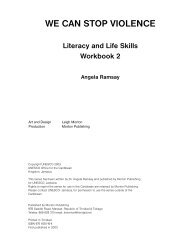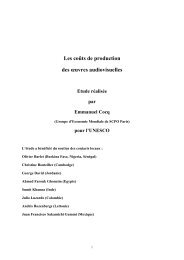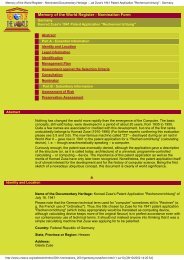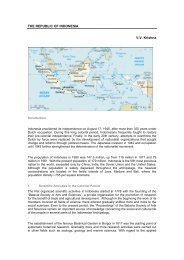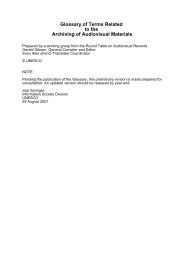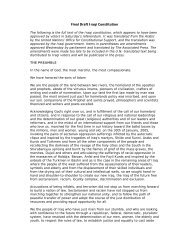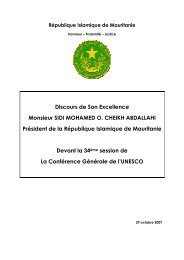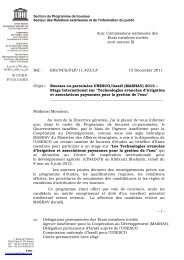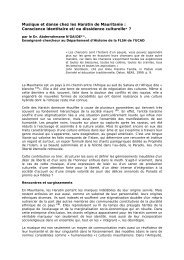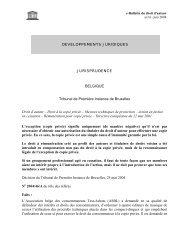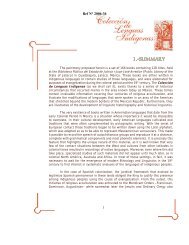Accepted Papers - 3.pdf - UNESCO
Accepted Papers - 3.pdf - UNESCO
Accepted Papers - 3.pdf - UNESCO
You also want an ePaper? Increase the reach of your titles
YUMPU automatically turns print PDFs into web optimized ePapers that Google loves.
end uses and the intentional management of water<br />
demands must now be considered major tools for<br />
meeting future water needs, particularly in waterscarce<br />
regions where extensive infrastructure<br />
already exists. There is great a potential for<br />
improving the “water efficiency” with which we<br />
produce food, by changing cropping patterns toward<br />
crops that require less water per calorie to produce,<br />
by reducing wasteful applications of water, by cutting<br />
losses between the field and the source, and by<br />
cutting diets.<br />
4. Water engineers should begin a systematic<br />
re-examination of engineering designs, operating<br />
rules, contingency plans, and water allocation policies<br />
under a wider range of climate conditions and<br />
extremes than has been used traditionally. For<br />
example, the standard engineering practice of<br />
designing for the worst case historical observational<br />
record may no longer be adequate. Recent flooding<br />
in Mumbai and the desert State of Rajasthan are<br />
examples.<br />
5. Cooperation between the water resources<br />
development agencies and leading scientific<br />
organizations can facilitate the exchange of<br />
information on the state-of-the-art thinking about<br />
climate change and impacts on water resources.<br />
6. The timely flows of information among the<br />
scientific global change community, the public, and<br />
the water-management community are valuable.<br />
Such lines of communication need to be developed<br />
and expanded.<br />
7. Traditional and alternative forms of new<br />
supply, already being considered by the water<br />
agencies, can play a role in addressing changes in<br />
both demands and supplies caused by climate<br />
changes and variability. Options to be considered<br />
include wastewater reclamation and reuse, water<br />
marketing and transfers, and even limited<br />
desalinization where less costly alternatives are not<br />
� � �<br />
487<br />
available and where water prices are high. None of<br />
these alternatives, however, is likely to alter the trend<br />
toward higher water costs.<br />
8. Prices and markets are increasingly important<br />
for balancing supply and demand. Because new<br />
construction and new concrete projects can be<br />
expensive, environmentally damaging, and politically<br />
controversial, the proper application of economics<br />
and water management can provide incentives to<br />
use less and produce more. Among the new tools<br />
being successfully explored are water banking and<br />
conjunctive use of groundwater.<br />
9. Even without climate change, efforts are<br />
needed to update and improve legal tools for<br />
managing and allocating water resources. Water is<br />
managed in different ways in different places around<br />
the country, leading to complex and often conflicting<br />
water laws. Lat’s remember that water is a State<br />
subject in India.<br />
10. The reliability of ground water as the most<br />
dependable source of irrigation has led to its overexploitation<br />
in many parts of the country. The<br />
development of this resource has not been uniform.<br />
The reason for this can be technical, socio-economic<br />
or political, but the non-uniform growth has created<br />
some management problems. Demand side<br />
management specially related to regulation, licensing,<br />
policing etc. are difficult to implement and are not<br />
appreciated by the users and public representatives.<br />
Supply side management of ground water resources<br />
and its augmentation through artificial recharge and<br />
rainwater harvesting would possibly bring positive<br />
results by increasing the water availability. Society<br />
and the common man need to be activated so that<br />
adequate water supply is ensured to everybody<br />
throughout the year. Rainwater harvesting schemes<br />
may be mandatory to all new buildings countrywide<br />
and the public needs to appreciate its advantages<br />
and necessity.



